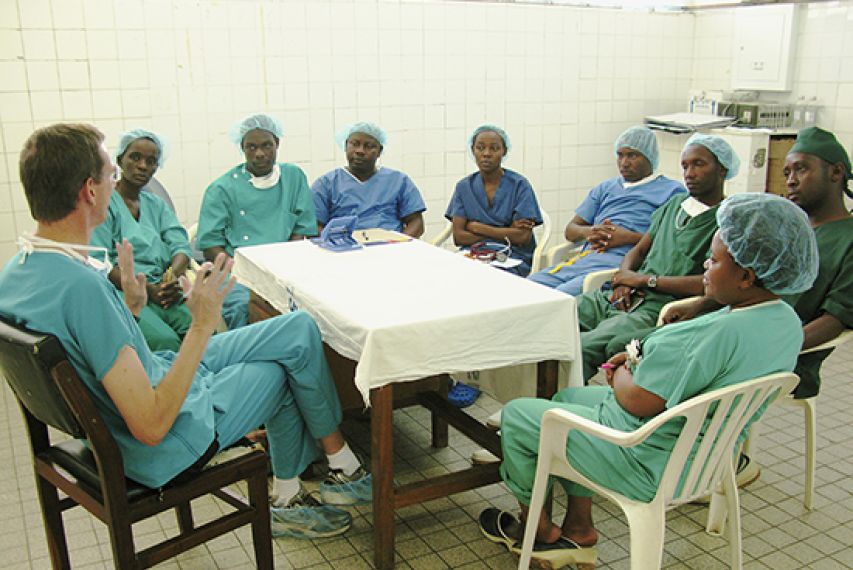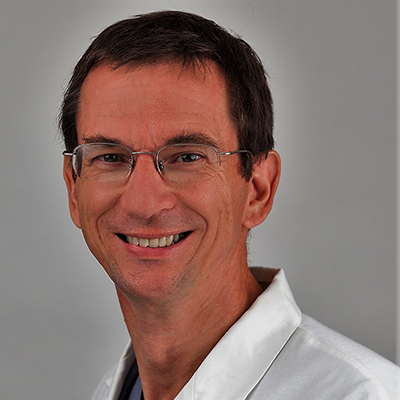Marcel Durieux is a professor in Anesthesiology and Neurological Surgery at the University of Virginia Health and has worked on number of global health projects in East Africa, all involving training in anesthesiology. He recently published a paper titled " A qualitative evaluation of an operational research course for acute care trainees in Kigali, Rwanda" in Pan African Medical Journal.
Emily Mellen, PhD+ intern at Global UVA, recently caught up with Dr. Durieux about his long association with Rwanda.
You recently published a paper about your research project in Rwanda. Tell us a little about that research?
Durieux: There is a lot of interest in low-middle income countries in training clinical providers-- surgeons, anesthesiologists, any kind of doctor or nurse-- typically at universities. These medical practitioners will become not only care providers, but also those who train the next generation of providers. They need to learn how to be university faculty, which is different from being a capable specialist in clinical practice.
The skills come down to two things: teaching experience and research skills. This program teaches them to do the research part. This is tough because in middle- and high-income countries, the practice is to do randomized trials, which are complicated and expensive and often difficult to perform in low-middle income countries.
As a solution, we modified a course by Doctors Without Borders and the International Union against Tuberculosis and Lung Disease called the Structured Operational Research Training Initiative to be more feasible in Rwanda. This paper reports on the first year of this course.
What were some of the key findings from this project?
Durieux: We really didn’t know how well this was going to work in the beginning and there were a couple of big ifs with this approach. For example, we did everything online, except for the very final part. Also, we were working with residents who were training as clinical specialists, so they didn’t have a lot of time. Though all six residents in this first course were successful in completing their projects, we were really interested to know what we could do better.
Our main findings were 1. It works. Half of the papers the students wrote were published and the rest of the papers are likely to be published later. 2. Students were really excited about this course and felt empowered because they could do studies that would improve their society by providing better care. Also, it prepared them to talk to researchers from other countries.
The obstacles we found were the same as those that led to creating this course. To give a little background, many practitioners from low-middle income countries take courses in the Western world on research, but don’t end up publishing. The main issues are time limitations, because students are pulled to clinical work, lack of writing skills, and lack of mentorship. We had the same problem with time limitations. Also, despite having as many mentors as there were students, communication was difficult, and students didn’t always get answers on time for the questions they asked. We had anticipated that cultural barriers would be another big obstacle, but, in reality, it was a very small minority of students who reported experiencing cultural barriers.
How did you get started on this topic and in this area of the world?
Durieux: It was kind of random, in a way. The Canadian Anesthesiologist Society and their U.S. counterpart have assisted in Rwanda with training since 2006. Because of the genocide, in 2006, there was only one anesthesiologist left in Rwanda. It was impossible to train a new generation of anesthesiologists with only one person in the country. So, the Canadians and the Americans began sending teachers. I began working with this program in 2012. Now, about 30 people have completed this training in Rwanda and there are another 20 in the pipeline of residency. Now, the issue is how these newly graduated residents are going to teach the new group, which goes back to those skills in teaching and research. Much of my background is in research, so it made a lot of sense for me to take on research development there.
You were able to keep up your research with Rwanda even during the pandemic, can you tell us a bit about how you managed that and what your research will look like post-pandemic?
Dureiux: Things didn't go as well as we had hoped. In terms of the course, making the transition was easy because everything is done online, so there was really no disruption of that part. But, all of these studies that the Rwandan students are training to do require some kind of data collection and there was a major interruption in data collection in hospitals.
The paper we discussed earlier reports on course one, which we finished before Covid. We had double the number of participants in the course two, but ran right into Covid shutdowns in Rwanda and it was cut short. Now, a majority of those projects have picked up again and are slowly collecting data, but the course was essentially stopped because they couldn’t keep up with what’s happening.
Post-pandemic, we have to realize that Africa is way behind in obtaining access to vaccines and getting the population vaccinated. Rwanda is approaching a 10% vaccination rate, which is still high for sub-Saharan Africa, but they, understandably, still don’t want anyone in hospitals except for patient care, so collecting data has essentially remained shut down.
We have another fairly large initiative, the E-global project, which connects UVA students with Rwandan students to do a collaborative research project. E-global was launched in December 2019, right before the pandemic, and because it’s entirely virtual, it has been able to roll along smoothly. This weekend, in fact, we launched a new year of this project. Hopefully, in a year they’ll have enough vaccines in Rwanda so that we can really pick up again with the training courses as well.
How do you notice UVA students being affected by this work?
Durieux: The impact is interesting because we have a very broad range of people participating and a subgroup of those truly get the bug for global health. Before the pandemic, we sent 10-20 UVA students to Rwanda for six weeks each year, to help with data collection and it included undergraduate students, medical students, and an occasional doctoral student.
Some of the UVA students who traveled to Rwanda wanted to remain connected and continued on to work with projects here. One example is Shannon Barter, who helped with getting this recent paper published. Three people who traveled to Rwanda just before Covid are now doing the new E-global program. We would like to bring Rwandan students to UVA as we did for the 5 years before Covid started.
Photo: Marcel Durieux talking to doctors in Tanzania. Photo Courtesy of: Marcel Durieux





